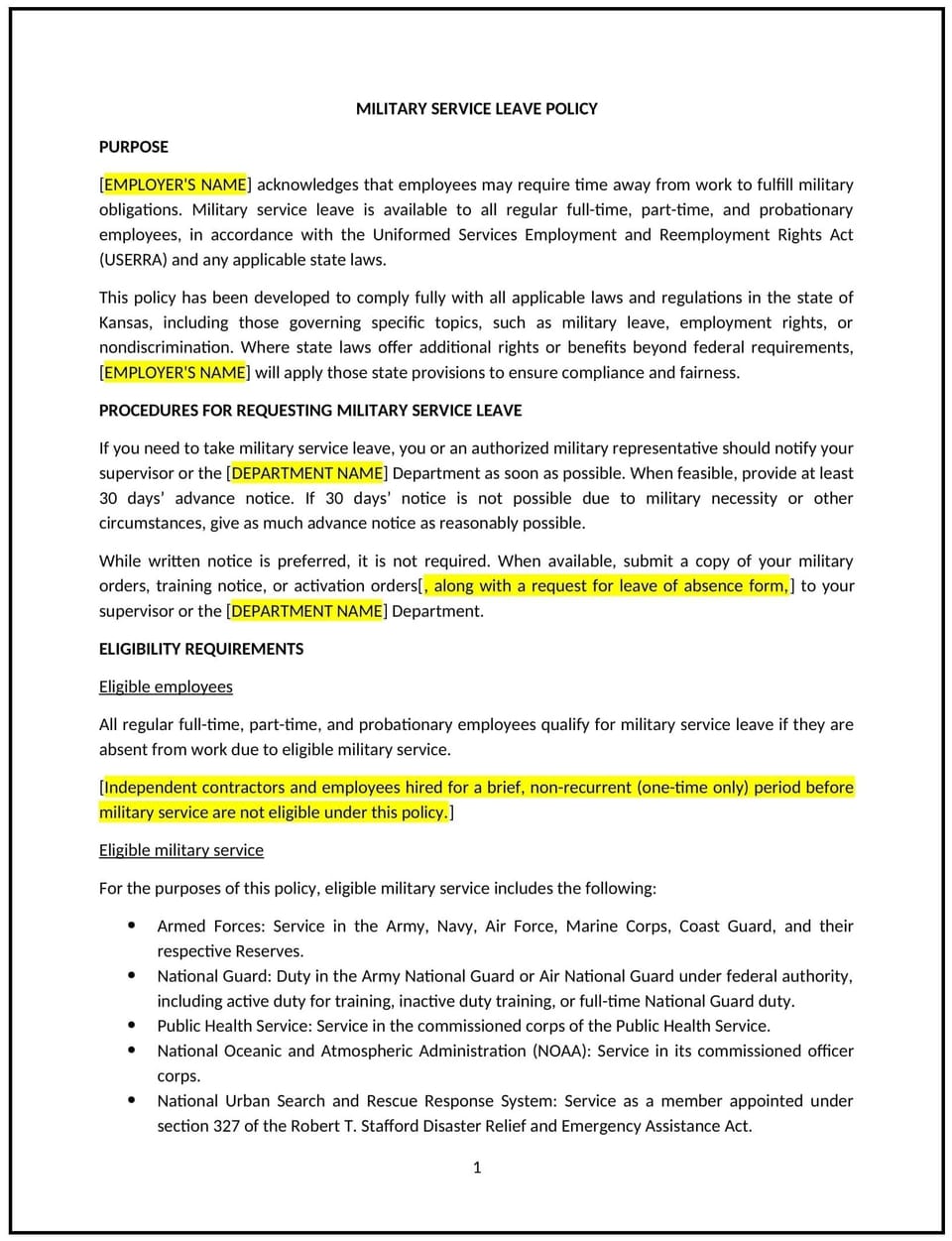Military service leave policy (Kansas): Free template

Military service leave policy (Kansas)
A military service leave policy helps Kansas businesses support employees who are called to active duty or required to participate in training or other military obligations. This policy outlines the rights and responsibilities of both the employer and employee regarding military service leave, including the duration of leave, pay arrangements, and job protection.
By implementing this policy, businesses can demonstrate support for employees serving in the military while maintaining fair practices in the workplace.
How to use this military service leave policy (Kansas)
- Define eligibility: Businesses should specify which employees are eligible for military service leave, based on factors such as their service status (active duty, reserve duty, or training).
- Outline the leave process: Businesses should establish clear procedures for employees to request military service leave, including how much notice they must provide and what documentation (such as military orders) is required.
- Set pay arrangements: Businesses should specify whether the leave will be paid, unpaid, or a combination of both. Some employers may choose to provide full or partial pay during military leave, while others may provide unpaid leave.
- Maintain job protection: Employees returning from military leave should be guaranteed the right to return to the same or a similar position, with the same seniority, status, and pay, as required by law.
- Address benefits during leave: Businesses should specify whether benefits (such as health insurance) will continue during military leave, and outline how employees can maintain coverage or reinstate it upon their return.
- Provide support for reintegration: Businesses should offer assistance and support for employees returning from military leave, ensuring a smooth transition back into their roles.
- Review and update regularly: Businesses should periodically review the policy to ensure it complies with current laws and reflects any changes in company practices or employee needs.
Benefits of using a military service leave policy (Kansas)
- Supports employees’ service obligations: A clear policy ensures that employees who serve in the military can do so without fearing negative consequences for their career or livelihood.
- Enhances company reputation: Demonstrating support for employees in the military boosts the company’s reputation as a responsible and community-minded employer.
- Increases employee loyalty: Supporting military leave fosters goodwill and can improve employee retention, particularly for employees who are active in the reserves or National Guard.
- Reduces legal risks: A clear military leave policy helps businesses comply with state and federal regulations, reducing the risk of legal issues related to military service leave.
- Promotes diversity and inclusion: Businesses that support military service demonstrate a commitment to diversity by recognizing the valuable contributions of employees with military experience.
- Improves workforce morale: Employees appreciate working for a company that respects their service and commitments, contributing to higher morale and job satisfaction.
Tips for using this military service leave policy (Kansas)
- Communicate the policy clearly: Businesses should ensure that all employees are aware of the military service leave policy and understand the process for requesting and returning from leave.
- Be flexible with documentation: While documentation is necessary, businesses should work with employees to ensure the process for submitting military orders is as smooth as possible.
- Offer support during the transition: Businesses should provide a supportive environment for employees transitioning in and out of military service, ensuring they feel welcomed upon their return.
- Monitor the leave process: Businesses should track military service leave to ensure that employees’ rights are respected and that the company remains compliant with all legal obligations.
- Stay informed about legal changes: Businesses should regularly review applicable federal and state laws regarding military leave to ensure they remain compliant with any updates or changes.
Q: Why should Kansas businesses implement a military service leave policy?
A: Businesses should implement a military service leave policy to support employees who are called to active duty or required to participate in military training, ensuring that employees’ rights are protected and that the business complies with relevant laws.
Q: What types of military service qualify for leave under this policy?
A: Eligible military service typically includes active duty, reserve duty, and training for employees who serve in the U.S. military, National Guard, or military reserves.
Q: How much notice do employees need to give before taking military service leave?
A: Employees should provide as much notice as possible before their leave, typically by submitting military orders or documentation outlining the dates of service.
Q: Will employees be paid during military service leave?
A: The policy should specify whether military service leave will be paid, unpaid, or partially paid. Some businesses offer full or partial pay, while others may provide unpaid leave.
Q: How can businesses support employees upon their return from military service leave?
A: Businesses should ensure that employees returning from military service are re-integrated smoothly into their roles, with support for any necessary adjustments or training to help them transition back to work.
Q: How often should businesses review and update their military service leave policy?
A: Businesses should review the policy at least annually or when there are significant changes in relevant laws or company operations to ensure it remains up to date and compliant with legal requirements.
This article contains general legal information and does not contain legal advice. Cobrief is not a law firm or a substitute for an attorney or law firm. The law is complex and changes often. For legal advice, please ask a lawyer.


